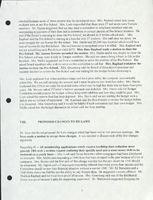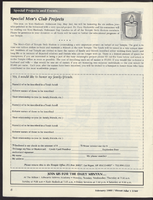Search the Special Collections and Archives Portal
Search Results

Minutes from Temple Beth Sholom Board of Directors meetings, June 1996 - May 1997
Date
Archival Collection
Description
Meeting minutes include reports from committees of the board, correspondence, and balance sheets.
Text

Craig Galati Interview, October 24, 2016: transcript
Date
Archival Collection
Description
always thought I'd be more urban. I would live in a downtown city. I wouldn't have a car. I would walk around. I would work on these big skyscrapers.” At one point in his life, architect Craig Galati dreamt of designing large buildings in some of the nation’s biggest cities. Instead, he was drawn back to his childhood home of Las Vegas, where he created projects meant to preserve the city’s integrity, such as the Grant Sawyer State Office Building and the first building at the College of Southern Nevada Charleston Campus. He speaks to his work in preservation at the Las Vegas Springs Preserve and in welcoming visitors to Mount Charleston with his Spring Mountains Visitor Gateway design. In this interview, Galati talks about his parents’ decision to move from Ohio to Nevada and what it was like growing up in Las Vegas. He recalls his first teenage jobs in the Las Vegas of his youth and his studies in architecture at the University of Idaho. He recounts the dilemma of struggling to find architecture work he enjoyed and how that vision drew him back to Vegas. He describes various projects in his portfolio from his early years to the present. He speaks highly of his partnership with Ray Lucchesi and the basis for their vision: “We wanted to be a place that everybody liked to work for. Buildings were just tools to do something grander. They weren't an object. We had a philosophy that was not object based, it was people based.”
Text

Transcript of interview with Oliver Crickman by William Hawley, March 3, 1979
Date
Archival Collection
Description
On March 3, 1979, William Hawley interviewed Oliver Crickman (born 1933 in Apex, North Carolina) about his experiences from living in Nevada and working in restaurants. Crickman first describes his background and his first occupations prior to starting as a cook in Las Vegas restaurants. He then explains how he gradually moved from the position of cook’s helper to sous chef and his then-current position of executive chef at the Royal Inn. Crickman goes into detail about the operation of those restaurants and other Las Vegas Strip and Downtown Las Vegas properties, and he describes the demographics of cooks as well as how the hospitality industry has changed over time. The latter part of the interview involves a discussion of Crickman’s various residences in Las Vegas over time, the extent of crime, the first places to shop, and a brief discussion on mobile homes.
Text

Transcript of interview with Stanley and Sandy Mallin by Barbara Tabach, January 7, 2015
Date
Archival Collection
Description
Stanley Mallin (1923- ) was a native of Kansas City, Missouri; the son of Bess and Louis Mallin. His mother was a homemaker and his father was an industrious immigrant from Ukraine who earned his US citizenship through combat in World War I. Stan was the middle child of their three. It was while Stan attended the University of Missouri that he met Jay Sarno. The two men’s fast personal friendship made them solid business partners. Their first endeavor was in Florida with a tile business. It was during a holiday stay at the Flamingo that the two dreamed a bigger, better hotel-casino. The result was Caesars Palace. He has lived and helped develop Las Vegas since 1968. In 1982, Stan married his wife Sandy (neé Jacoby) Mallin. Sandy grew up in New York and arrived in Las Vegas in 1977. She has provided dynamic leadership in the Jewish community. For several years she was President of the Women’s Division of Jewish Federation. She then followed this as the first woman to be President of T
Text

Transcript of interview with Flora Mason by Barbara Tabach, December 8, 2014
Date
Archival Collection
Description
Flora Mason (1940- ) is a Las Vegas, Nevada philanthropist and community leader. She was born Florica Esformes to a Sephardic Jewish parents who emigrated from Greece to New York. This Mediterranean influence can be seen in the meals she serves for the Jewish holidays. Flora?s grandfather had a pushcart business in New York and her father became a produce broker, which led the family to Miami, Florida. She graduated from high school in Miami and also met Stuart Mason there. The young couple married in 1958. They had been married for 58 years when Stuart passed away in 2012. In this oral history, Flora recalls her life?from witnessing signage that read: no blacks, no dogs, no Jews in the South to meeting her husband while a teenager to raising her three children in Las Vegas. Along the way, she has always found time to form fast friendships and to inspire productive community organizations. v For example, Flora and Stuart founded the Las Vegas Chapter of the Juvenile Diabetes Foundation in 1970. It was a disease that their daughter Deborah had suffered from. They also established the Mason Undergraduate Peer Coach Program at University of Nevada, Las Vegas Libraries in 2006. Flora was the first woman elected by the general membership to serve on the Temple Beth Sholom Board of Directors. She has served on the National Board of Directors of the Juvenile Diabetes Research Foundation, been involved with the Jewish Federation of Las Vegas, the Anti-Defamation League among many other Jewish and non-Jewish community organizations. Flora?s college education began at the University of Miami and focused on completing both her undergraduate and graduate degrees at UNLV, where she majored in English literature. She then became a lecturer in the UNLV English department from 1985 to 1993. Flora and Stuart Mason had three children: sons William and James who joined the family?s successful three-generation commercial construction business Taylor International, and daughter Deborah. In this oral history, Flora shares the joy of being a grandparent, her love of travel, and the opportunities of meeting Israeli dignitaries over the years. She also candidly reflects on dealing with grief and the Jewish rituals surrounding death.
Text

Transcript of interview with Jerry Engel by Barbara Tabach, March 1, 2016
Date
Archival Collection
Description
Jerry Engel was born in 1930 in New Jersey and spent most of his early life in Long Beach, New York until the family moved westward to Las Angeles. Jerry is a retired Certified Public Accountant and loves to talk about the history of Las Vegas that he observed since arriving in 1953. That was the year that he moved to Las Vegas to join his older brothers, Morris and Phil, in their accounting firm. Their major client at the time was Desert Inn. Another personal connection with local history: the Engel brothers? mother, Esther Katz Engel, was among the early investors in the Moulin Rouge hotel/casino enterprise. Jerry graduated with honors from University of California, Los Angeles in 1951. His accounting career in Las Vegas is highly regarded and he continues to maintain a consulting practice. He remains active within the community and enjoys doing presentations based on his memories of Las Vegas history. Within this interview, Jerry highlights people, casinos and other observations of local history that he came into contact with over the decades. He provides insights about the role of an accountant in the gaming industry. He also discusses the influence of Jewish business leaders in and array of local gaming and non-gaming issues, including the retail world, Jim Crow era segregation, and the astonishing growth of the valley over six decades.
Text

Transcript of interview with Martin, Linda, and Robert Wilner by Barbara Tabach, May 10 & 24, 2016
Date
Archival Collection
Description
During the early 1970s, the boom of Las Vegas included many single people following family who had already settled there. Among those was Martin (Marty) Wilner. Marty?s parents were Leo and Mickey Wilner. Leo moved to Las Vegas to become the Executive Director at Temple Beth Sholom, the only synagogue in town. Marty, who was born and raised in California, had recently earned his doctorate in psychology at the University of Houston. He became a counselor at UNLV. Not long after, Marty met Linda at a Jewish Singles event. Linda was a divorced, mother of three children, who had moved from California to find comfort in living near her parents. Robert Wilner is one of her three children. He was adopted by Marty and works with his mother in the real estate business. In this interview, they recall together the Las Vegas of the 1970s. For Robert, he remembers his bar mitzvah, and growing up with Jewish friends under the careful eye of his grandparents. As an adult, he has enjoyed a successful career as a real estate agents working with his mother. For Linda, the success of real estate was being part of one of the most robust housing markets in the country. She and Robert recall an extensive list of visionaries who developed the valley, as well as the inherent challenges of water, unions and maintaining their high level of ethics.
Text

Transcript of interview with Ron Lurie by Barbara Tabach, June 5, 2015
Date
Archival Collection
Description
Interview with Ron Lurie by Barbara Tabach on June 5, 2015. In this interview, Lurie discusses his family and his time in politics, campaigning for office, and some of his accomplishments while in office as mayor and in the city council. He also talks about growing up in Las Vegas and attending Las Vegas High School, and working for his father, Art Lurie, in the grocery store business.
Ron Lurie was a rambunctious teenager when the Lurie family moved to Las Vegas from California. He adapted quickly to Las Vegas and made fast friends. He is a 1958 graduate of Las Vegas High School. His father, Art Lurie, a supermarket businessman, was also a well-known professional boxing judge and a former Nevada Athletic Commission chair. In 1987 Ron became the first person of Jewish ancestry to be elected Mayor of Las Vegas. Previously, he was fourteen year member of the Las Vegas City Council and served on many community boards and commissions. Since political office was not a fulltime position, Ron's career path developed in a couple of different ways. He tells the story of becoming a butcher and the opportunities he experienced becoming a successful salesman of gaming machines for Si Redd, IGT and others. His over three decade gaming career continues as of this oral history. He is executive vice president and general manager of Arizona Charlie's Decatur location. In this oral history he reflects on some of his political accomplishments as mayor and city councilman. He also served six years on the State of Nevada Wildlife Commission and is a member of the Fraternity of the Desert Bighorn.
Text


